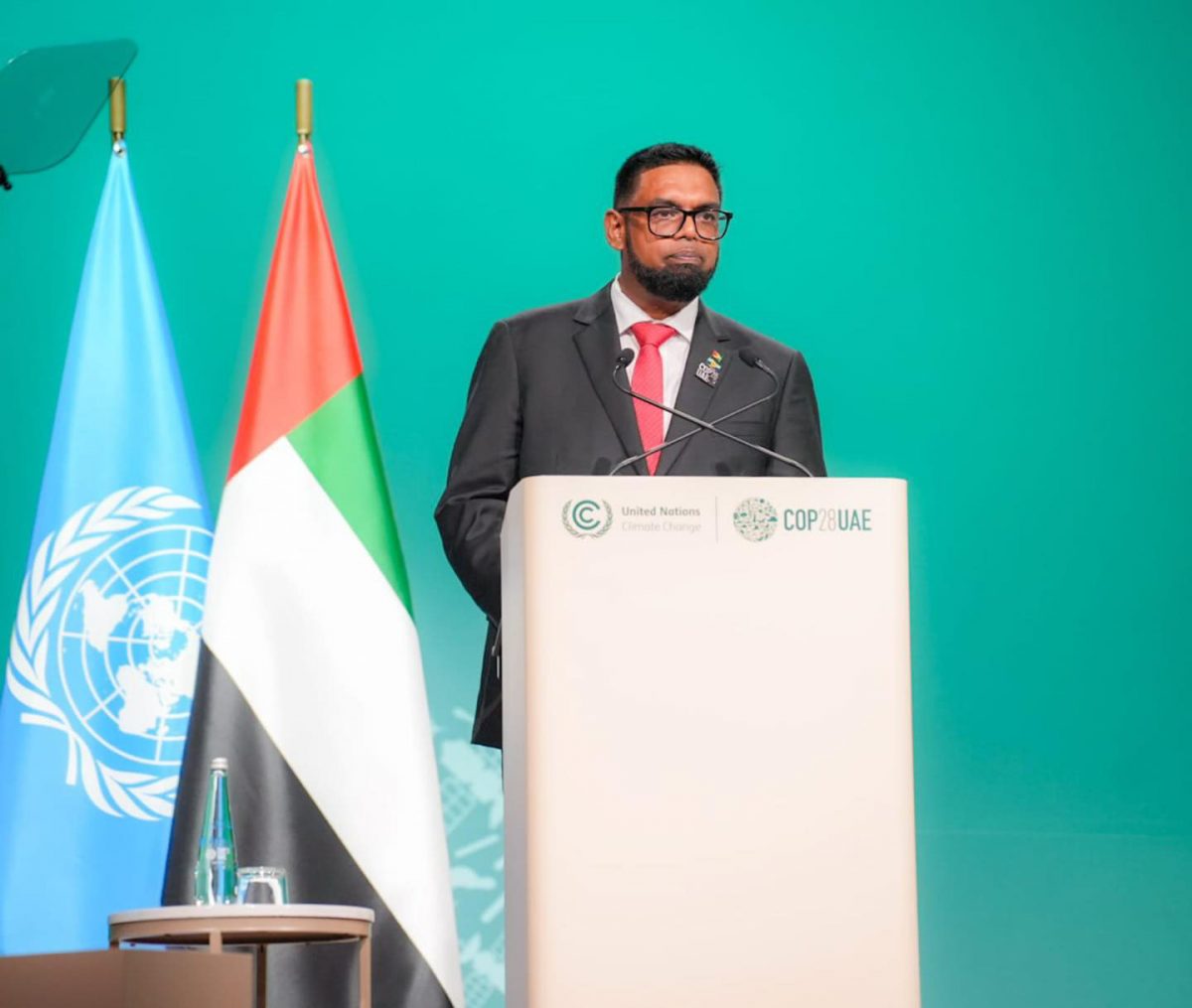Guyana’s Head of State, Irfaan Ali has urged world leaders to cast aside the “doctrinaire approach” towards achieving net zero by 2050, and devise realistic solutions as climate action cannot be to the detriment of the world’s developing countries and poorest people.
The President was speaking on Friday at the United Nations Framework Convention on Climate Change (UNFCCC) Conference of Parties (COP) 28 in Dubai, United Arab Emirates (UAE).
He said COP28 cannot achieve its desired purposes, by ensuring the globe fully accomplishes net zero, if global stakeholders are not unified on the matter at hand.
“If the debate at COP28 is framed by two camps: one calling for no cuts in fossil fuel production, including the most polluting form such as coal, and the other saying that the only solution to net zero is an end to fossil fuel production, then we will fail once again to achieve a viable outcome, and not to give our world the energy it needs to grow and prosper,” President Ali said.
He posited that what was needed instead was an amalgam of measures to achieve this target by 2050.
“I believe that net zero by 2050 as a target can only be achieved by a combination of measures that include: a reduction in the fossil fuel production and the removal of large polluters out of the supply chain – and we reiterate our call for the removal of subsidies; incentivizing the introduction of renewables at scale; addressing the energy demand; upscaling technology, for example, carbon capture and storage; and reduction in deforestation and land degradation through incentivizing the protection and sustainable management of forests.”
Ali called on the Conference of Parties to agree to an impartial, orderly and affordable transition away from excessive fossil fuel use and a transition that also includes accessible climate finance for developing countries and actions that could result in the maintenance of tropical forests and sustainable land use.
“Specifically, on tropical forests, this COP must finally turn the promise of climate action into reality. Halting and reversing forest loss globally by 2030 is potentially one-third of the available solution to keep 1.5 degrees in reach. Finance is key and Guyana is pleased to co-chair the carbon markets working group of the Forest and Climate Leaders Partner-ship (FCLP), consisting of 30 countries. Along with our partners in the FCLP, we will be working to build high-quality carbon markets so that forest communities and countries can prosper while keeping nature intact.
He reiterated that Guyana was the first developing country, back in 2008, to produce a Low Carbon Development Strategy (LCDS), and today, maintains one of the world’s most intact tropical forests. He also gave the assurance that despite its nascent oil and gas sector, Guyana intends to remain a carbon net-positive country
“Our economy will grow more than three-fold while keeping energy-related emissions flat. We are building an ecosystem services economy, with forest carbon markets generating 4.5% of government income this year alone,” he disclosed.
Meanwhile, Vice President, Bharrat Jagdeo yesterday announced at COP28 that Guyana is expected to earn more than US$2.5 billion in the next ten years, consequent to its robust campaign of forest conservation.
Sharing the stage with the presidents of Indonesia and Ghana, Jagdeo also brought up the subject of access to global incentives for forests and sufficient climate financing as Guyana continues to roll out the sale of carbon credits.
Last year, Guyana became the first country to earn money for protecting its rainforests through the sale of its carbon credits under the Architecture for REDD+ Transactions (ART) TREES credit programme.
The world leaders were told that US$22.5 million had been allocated towards 242 Indigenous communities to aid in the implementation of adaptation, development, and livelihood, in many of these hinterland areas, followed by an additional US$125 million being invested through multi-community and national programmes.
Against that background, Jagdeo made it clear that Guyana will not hesitate to remind the international community that emphasis cannot only be on funding initiatives, but that mechanisms of sustainability are also important.
The COP 28 Summit which began on November 30 is expected to wrap up on December 12.






